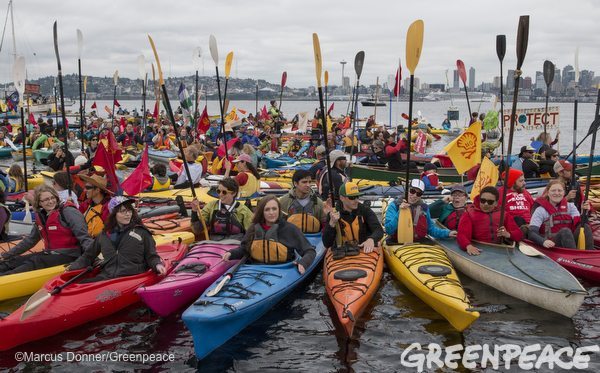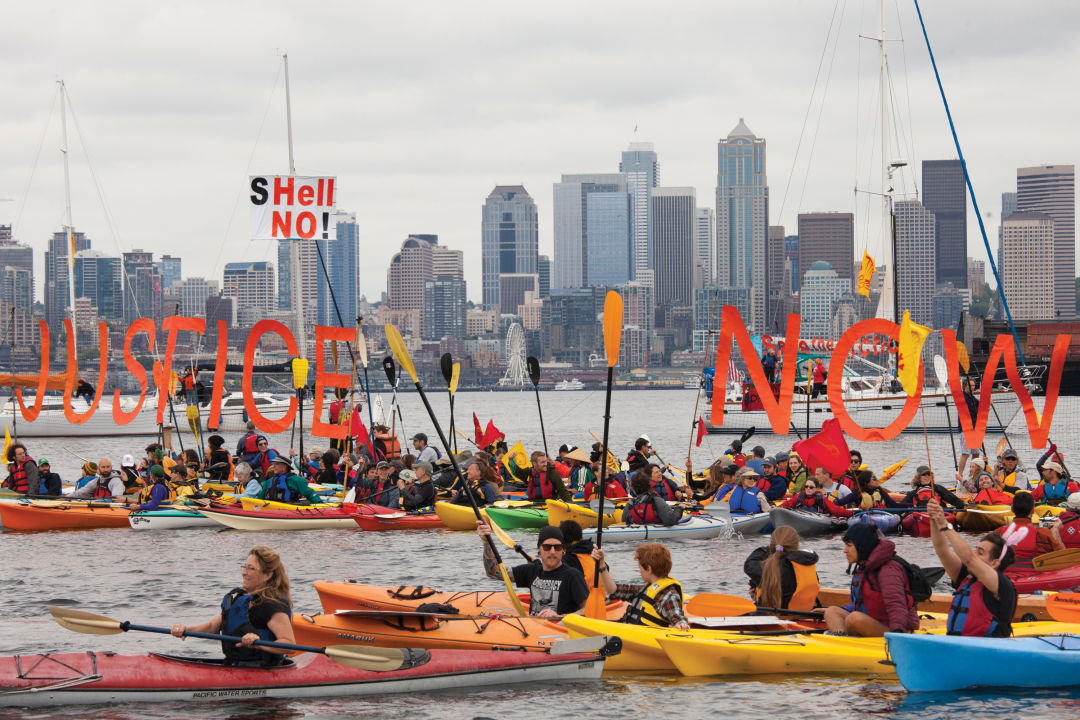
Grassroots “Kayaktivists” Confront Tankers
Importing Crude Oil for Chevron
Liza Gross / Inside Climate News
(May 6, 2024) — A generation of Richmond’s children, now grown, took to San Francisco Bay in nearly five dozen kayaks Sunday morning, in the shadow of Chevron’s massive refinery, headed for tankers controlled by the oil giant in an act of resistance, prayer and joy.
After singing a ceremonial song led by a local Indigenous leader, activists launched their kayaks around 9:30 a.m. from the shores of Point Molate, 20 miles north of San Francisco, to protest the environmental and health harms caused by Chevron’s Richmond Oil Refinery.
By noon, a core group of the Rich City Rays, a coalition of grassroots community groups based in Richmond, a San Francisco suburb where most residents are Asian, Black or Latino, had entered restricted waters alongside two giant tankers docked at the Chevron Long Wharf. Once activists in about 20 kayaks had jockeyed into position, side by side, they unfurled a banner with “Abolish Chevron” written in bright red letters, as the rest of the flotilla erupted in cheers.
Tankers unload crude oil from around the world at Chevron’s Long Wharf, the largest marine oil terminal in California, and pick up petroleum products processed at its refinery, including lubricants, gasoline, jet and diesel fuel. The refinery processes about 250,000 barrels of crude oil a day and transports refined products to the wharf via pipeline.
The Rich City Rays embrace kayaking as a form of nonviolent protest to raise awareness about the disproportionate harm oil development, from extraction to refining, causes communities of color like Richmond. The “kayaktivists” deploy their crafts as vessels for social change in nonviolent actions designed to call attention to the global reach, and harm, of the oil giant that operates in their backyard.
“A lot of us are young people who don’t know a time before climate change,” said Alfredo Angulo, an organizer of the Rich City Rays who just turned 24 and uses they/them pronouns.

Angulo, who led the group’s charge toward the tankers, said the Rays’ organizing efforts have focused on lifting the voices of local residents, helping people share the harms they experience from the climate crisis and the role Chevron plays in that.
Angulo, like many of their fellow activists, learned about the human costs of society’s dependence on fossil fuels—and the disproportionate risks borne by communities of color like Richmond—when a catastrophic explosion at the refinery darkened the community’s skies more than a decade ago.
Angulo was 12 years old in 2012, when a Chevron refinery pipe carrying about 10,800 barrels of petroleum ruptured. Around 6:30 on the evening of Aug. 6, the pipe released highly flammable oil, which quickly ignited, enshrouding Richmond in a dark cloud of vapor, particulates and black smoke. About 15,000 people in the area sought medical treatment for breathing problems, chest pain, asthma, headaches and other ailments in the weeks after the incident and 20 required hospitalization.
Angulo, who grew up a few miles from the refinery, believes the incident galvanized a generation of activists. “It served to piss off a whole generation of young people who saw what this corporation was doing to our community, to our neighbors, to our parents, our grandparents, our cousins, our friends,” they said.
Alfredo Angulo, an organizer with the “kayaktivist” group Rich City Rays, led their fellow Richmond residents in a nonviolent action to confront Chevron oil tankers on San Francisco Bay. Credit: Liza Gross/Inside Climate News
The explosion was “a really dark day for the city of Richmond as a whole,” Angulo said. But it also showed residents exactly how the fossil fuel industry was directly harming them.
For Angulo, a child of Mexican immigrants, it was deeply personal. “We brought my grandmother from Mexico that year, so she could get better medical attention as she got older,” they said, clearly frustrated. “And, you know, Chevron made sure that the opposite of that happened.”

The Rich City Rays on paatrol in San Francisco Bay.
Their grandmother developed asthma soon after the incident. The rate of asthma attacks in Richmond is nearly double the statewide rate.
As Angulo and their fellow Rays paddled the two miles out to Chevron’s Long Wharf under a brilliant blue sky, pelicans dive-bombed for fish, cormorants flew overhead and curious seals tagged along, seeming to act as self-appointed guardians. Each kayak carried a banner with slogans like “Resist, Rise for Climate Justice” and “Stand Up to Big Oil,” as paddlers navigated the choppy waters of the bay, riled by heavy rains the day before.
The explosion was “a really dark day for the city of Richmond as a whole,” Angulo said. But it also showed residents exactly how the fossil fuel industry was directly harming them.
For Angulo, a child of Mexican immigrants, it was deeply personal. “We brought my grandmother from Mexico that year, so she could get better medical attention as she got older,” they said, clearly frustrated. “And, you know, Chevron made sure that the opposite of that happened.”
Their grandmother developed asthma soon after the incident. The rate of asthma attacks in Richmond is nearly double the statewide rate.
As Angulo and their fellow Rays paddled the two miles out to Chevron’s Long Wharf under a brilliant blue sky, pelicans dive-bombed for fish, cormorants flew overhead and curious seals tagged along, seeming to act as self-appointed guardians. Each kayak carried a banner with slogans like “Resist, Rise for Climate Justice” and “Stand Up to Big Oil,” as paddlers navigated the choppy waters of the bay, riled by heavy rains the day before.
A seal watches the Rich City Rays “kayaktivists” as they approach a Chevron tanker. Credit: Brooke Anderson
Once the kayakers situated themselves in front of a tanker and unfurled their “Abolish Chevron” banner, Angulo led the group in chants. “From Richmond to the Philippines, stop the U.S. War Machine!” they shouted. “If Richmond is under attack, what do we do?” Angulo asked. “We fight back!” the rest of the paddlers responded.
A crew member aboard one of the tankers appeared to be recording the kayakers’ activities and soon, the U.S. Coast Guard approached the group. Once the crew was satisfied the paddlers had undergone safety training and were committed to nonviolence, Angulo said, they left.
Chevron respects the rights of individuals to peacefully express their viewpoints, a spokesperson said of the protest. “Chevron Richmond remains focused on safely and reliably providing the essential energy that keeps the Bay Area moving.”
Our nonprofit newsroom provides award-winning climate coverage free of charge and advertising. We rely on donations from readers like you to keep going.